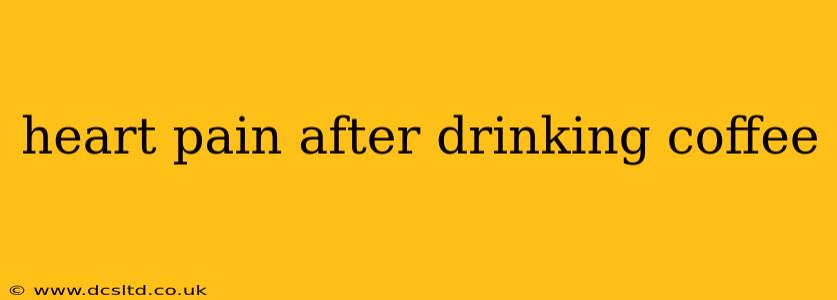Many people enjoy the invigorating boost of caffeine from their morning cup of coffee, but for some, that comforting ritual can be followed by an uncomfortable, even alarming, experience: heart pain. This isn't necessarily a reason to banish coffee entirely, but it's a crucial sign that warrants attention and understanding. This comprehensive guide explores the potential causes of heart pain after coffee consumption, offering insight into prevention strategies and when to seek professional medical advice.
What Causes Heart Pain After Drinking Coffee?
The link between coffee and heart pain isn't always straightforward. It's rarely a direct cause of a serious cardiac event, but rather a trigger that can exacerbate existing conditions or symptoms. Here are some of the key possibilities:
-
Increased Heart Rate and Blood Pressure: Caffeine is a stimulant that directly affects the nervous system, increasing heart rate and blood pressure. For individuals with underlying heart conditions like angina (chest pain due to reduced blood flow to the heart), or those sensitive to caffeine's effects, this increase can trigger or worsen chest pain.
-
Acid Reflux: Coffee's acidity can irritate the esophageal lining, leading to heartburn. This burning sensation can be mistaken for heart pain, particularly because the pain is often felt in the chest.
-
Anxiety and Panic Attacks: Caffeine can heighten anxiety levels. For those prone to anxiety disorders, a cup of coffee could trigger a panic attack, manifesting as chest pain, palpitations, and shortness of breath.
-
Pre-existing Heart Conditions: Individuals with diagnosed heart problems are more likely to experience chest pain after coffee due to the stimulant's effects on the cardiovascular system. This underscores the importance of consulting a cardiologist before making significant dietary changes if you have a known heart condition.
-
Dehydration: While less directly linked, dehydration can exacerbate heart-related symptoms. Coffee acts as a mild diuretic, meaning it can increase urination, potentially leading to dehydration if not balanced with adequate water intake.
Is It a Heart Attack?
This is a critical question, and the answer is almost always no. While coffee can trigger symptoms that mimic a heart attack, such as chest pain and shortness of breath, true heart attacks usually present with more severe and sustained symptoms, including:
- Crushing or squeezing chest pain: The pain is typically intense and doesn't go away.
- Pain radiating to the arm, jaw, neck, or back: The pain is felt beyond the chest.
- Shortness of breath: Difficulty breathing accompanies the chest discomfort.
- Nausea and sweating: These are common accompanying symptoms.
If you experience symptoms suggestive of a heart attack, seek immediate medical attention. Do not delay.
How Can I Prevent Heart Pain After Drinking Coffee?
Several strategies can help minimize the risk of experiencing heart pain after consuming coffee:
- Moderate your caffeine intake: Don't consume excessive amounts of coffee. Start with smaller portions and gradually increase the quantity if tolerated.
- Choose decaf options: Consider switching to decaf coffee to reduce caffeine's effects.
- Stay hydrated: Drink plenty of water throughout the day to offset coffee's diuretic effect.
- Avoid coffee on an empty stomach: Consuming coffee with food can help buffer its acidity and reduce the likelihood of heartburn.
- Manage underlying conditions: Effectively managing pre-existing conditions like anxiety and acid reflux can help reduce the risk of triggering heart pain.
- Listen to your body: Pay attention to how your body responds to coffee. If you experience discomfort, reduce your intake or avoid it altogether.
What Should I Do If I Experience Heart Pain After Drinking Coffee?
If you experience chest pain after drinking coffee, especially if it's accompanied by other symptoms like shortness of breath or dizziness, consult a doctor immediately. They can perform a thorough examination to determine the underlying cause and recommend appropriate treatment.
Can I Still Drink Coffee If I Have Heart Problems?
The answer depends entirely on your individual health condition and its severity. Some individuals with heart problems might be able to tolerate coffee in moderation, while others might need to avoid it completely. Consult your doctor or cardiologist for personalized advice. They can assess your specific situation and advise on whether coffee is safe for you.
Is Heart Pain After Coffee a Sign of a Serious Problem?
Not necessarily. As explained above, it's more often a symptom exacerbated by caffeine's effects or a sign of an underlying condition. However, it's crucial to seek medical evaluation to rule out serious cardiac issues and identify the specific cause of your discomfort.
This information is for general knowledge and does not constitute medical advice. Always consult a healthcare professional for any health concerns or before making any decisions related to your health or treatment.
